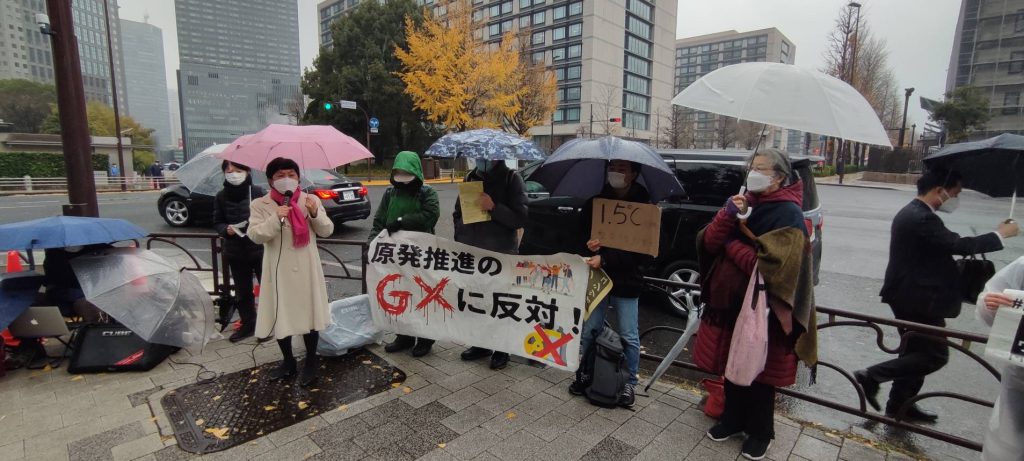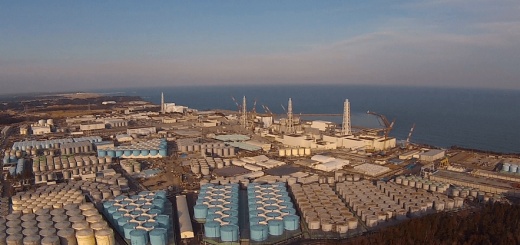CNIC Statement: We Protest the Cabinet Decision on the Nuclear Power Promotion Bundle Bill
28 February 2023
Today the Kishida Cabinet made a cabinet decision to proceed with a bundle of bills (the GX Decarbonization Power Supply Bill), including legislation to extend the operational periods of nuclear power plants and to promote the use of nuclear power. We firmly protest this decision, which totally disregards the lessons of Fukushima.
What “careful explanation”?
The Government has repeatedly stated that it will make “careful explanations” to address the public’s concerns regarding the utilization of nuclear power plants since the GX policies were announced. However, this bill seeks to amend the Atomic Energy Basic Law, the Electricity Utilities Industry Law, the Nuclear Reactor Regulation Law, the Reprocessing Law and the Renewable Energy Special Measures Law all at once. How can so many revisions with so many points of contention possibly be “carefully explained”? Even at the stage of deliberations leading up to the drafting of the bill, discussions were hasty to say the least. Why must nuclear policy be changed immediately? The situation in Ukraine and resource prices are cited as reasons, but these have nothing to do with extending the operational period or building new nuclear power stations, let alone restarting them. We can only assume that the government are trying to take advantage of the crisis to promote their nuclear policy.
Safety in the back seat
There are a number of problems with each of the bills. For example, the revision bill for the Atomic Energy Basic Act states that “safety first “ should be the approach for the use of nuclear energy and that the value of nuclear energy use, such as its contribution to stable supply and green transformation, will be clarified. We disagree that nuclear power is useful for stable supply and decarbonisation, but before that, there is a serious problem. The proposed revisions transfer the regulation of the operation period of nuclear power plants from the Reactor Regulation Act to the Electricity Business Act, and also changes the operation period from 40 years in principle, allowing a maximum of 20 years extension on a one-time basis of the operation period, which is supposed to adjust for shutdown periods.
While assuring “safety first”, the government is trying to transfer the operation period regulation, a safety regulation introduced based on the lessons learnt from the Fukushima Daiichi nuclear accident, from the Nuclear Reactor Regulation Law, which is under the jurisdiction of the regulatory authority (the Nuclear Regulation Authority-NRA), to the Electricity Utilities Industry Law, which is under the jurisdiction of the utilizing authority (the Ministry of Economy, Trade and Industry-METI). This in itself can only be described as a setback for nuclear safety regulation. Furthermore, METI’s Nuclear Energy Subcommittee’s summary also contemplates allowing further extensions in the future. Such discussions would not be possible if utilization did not take precedence over regulation.
The proposed revision to the Nuclear Reactor Regulation Law will also legislate on the assessment of ageing nuclear power plants, which was previously a rule of the NRA. The Government and the NRA state that this will lead to stricter regulations, but that the substance of these stricter regulations will be discussed in the future. This in itself is a clear indication of the government’s attitude that nuclear power must be promoted according to their timetable and compared to this, nuclear safety is of secondary importance.
The NRA explains that the degradation status of a reactor can be assessed at any point in time. However, there are no nuclear power plants in the world that have been in operation for more than 60 years to begin with, and the older a reactor gets, the more its operating history will differ from the deterioration state of the reactor due to the characteristics of the materials. Even if an inspection is carried out, it is only an inspection at that point in time and cannot be said to prove safety in the future. In fact, on 30 January this year, Takahama Unit 4 automatically shut down due to a problem, but on 25 November last year, Kansai Electric Power Company had just announced that it had carried out an equipment integrity assessment (number of devices covered: approximately 4,200 devices/units) based on the assumption of a 20-year extension and ‘confirmed that there were no problems’.
Blurring the lines between operators and regulators
A major lesson of the Fukushima Daiichi nuclear disaster was that the operators of nuclear power plants must be separated from those who regulate them. Twelve years after the accident, this separation is now in great danger. We believe that the right option is to move away from nuclear power, but strict regulation is a minimum requirement for both the operation and the decommissioning of nuclear power plants. However, the regulations which are supposed to be enforced by the NRA, are limited by the framework of promoting the use of nuclear energy. In recent times, very few suspension orders have been issued and no reactor licenses have ever been revoked. Remedies are also sought through “guidance and suggestions” from the reviewing authority. With such a form of regulation and the integration of regulation and promotion, is there any hope for strict regulation? Although it is said that deterioration can be assessed at any point in time, there are no clear boundaries in the deterioration of nuclear power plants. We can only make engineering decisions under great uncertainty. Under these conditions, can the regulations be trusted to always side with the safer option?
In the current nuclear policy changes, regulation and promotion have been shown to be one and the same. Several members of the NRA have expressed their discomfort that the discussions had to conform to a fixed schedule.
Before discussing the issue of extension of the operating period, it is the state of nuclear regulation that must be questioned. If the Fukushima Daiichi nuclear accident is the starting point for nuclear policy, the GX Decarbonisation Power Supply Bill must be scrapped, and we must consider how to ensure that nuclear regulation and promotion are kept totally separate, and how strict regulation can be achieved. Without this, we can never put an end to the “safety myth” and it will be impossible to realize the most basic condition for the use of nuclear power.


